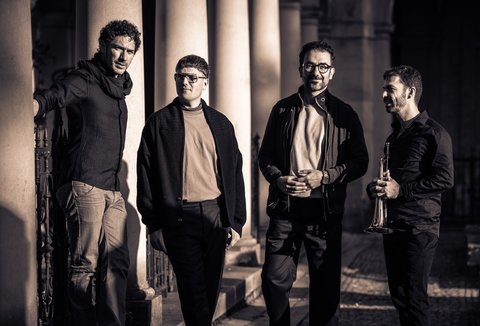MASAA – four musicians who praise the evening when people come together and meet, intensively exchanging ideas about the day – this is the meaning of the Lebanese band name. They do this in a kind of musical conviction of closeness, curiosity and togetherness. The intensity the ensemble creates in their music is so tangible and all-encompassing that their touch makes you believe music can move the world. Masaa creates songs on the highest musical level that show how complex and at the same time close our togetherness is.
For many years, they have been fascinating audiences in both East (from Tunisia to Azerbaijan all the way to Izmir, Turkey) and West (from Spain to Germany, where the four musicians are based, to Great Britain). On their last album, »Irade«, the band celebrated the addition of their new member Reentko Dirks, whose guitar mastery added spectacular new facets to the group’s sound. In 2021 »Irade« was awarded the German Jazz Prize in the category Vocal Album of the Year, and the Lebanese singer, poet and composer Rabih Lahoud, who lives in Monheim near Cologne, received the WDR Jazz Prize as well.
The new, fourth album »Beit« manifests the musical depth of the band, their unique sonic language and the creative will of everyone involved. Songs with tempo and drive create contrasts to slower pieces, whose intensity results from reduction. In between, there are pieces with a strikingly dynamic development.
Rabih Lahoud’s captivating vocals, with expressiveness over several octaves up into high registers, consistently form the quartet’s gravitational center. The playing of trumpeter Marcus Rust, unmistakably rooted in contemporary jazz, spans from lyrical passages to rhythmic phrasing and exciting dialogues with Lahoud’s melismas. Drummer Demian Kappenstein supports and inspires with ease, sometimes sensitive, sometimes lurking or energetic. In addition Reentko Dirks creates versatile sounds with his special double neck acoustic guitar.
Many pieces of the album are based on personal experiences that in discourse evoke universal thoughts. The togetherness and mutual understanding from which creativity emerges is a central idea of »Beit« (in English: house, home). »Home is not a particular place or space. It is something that arises primarily on an interpersonal level and is projected onto places and spaces. It fascinates me that through intensive dialogues we can build a kind of house, create a home,« says Lahoud, »we need a place for this, where people can be and communicate with each other as equals. And when the music sounds, the new unknown space turns into a familiar environment, a home is created, and through the familiarity and security that comes with it, the possibility to freely express the inner arises.«
